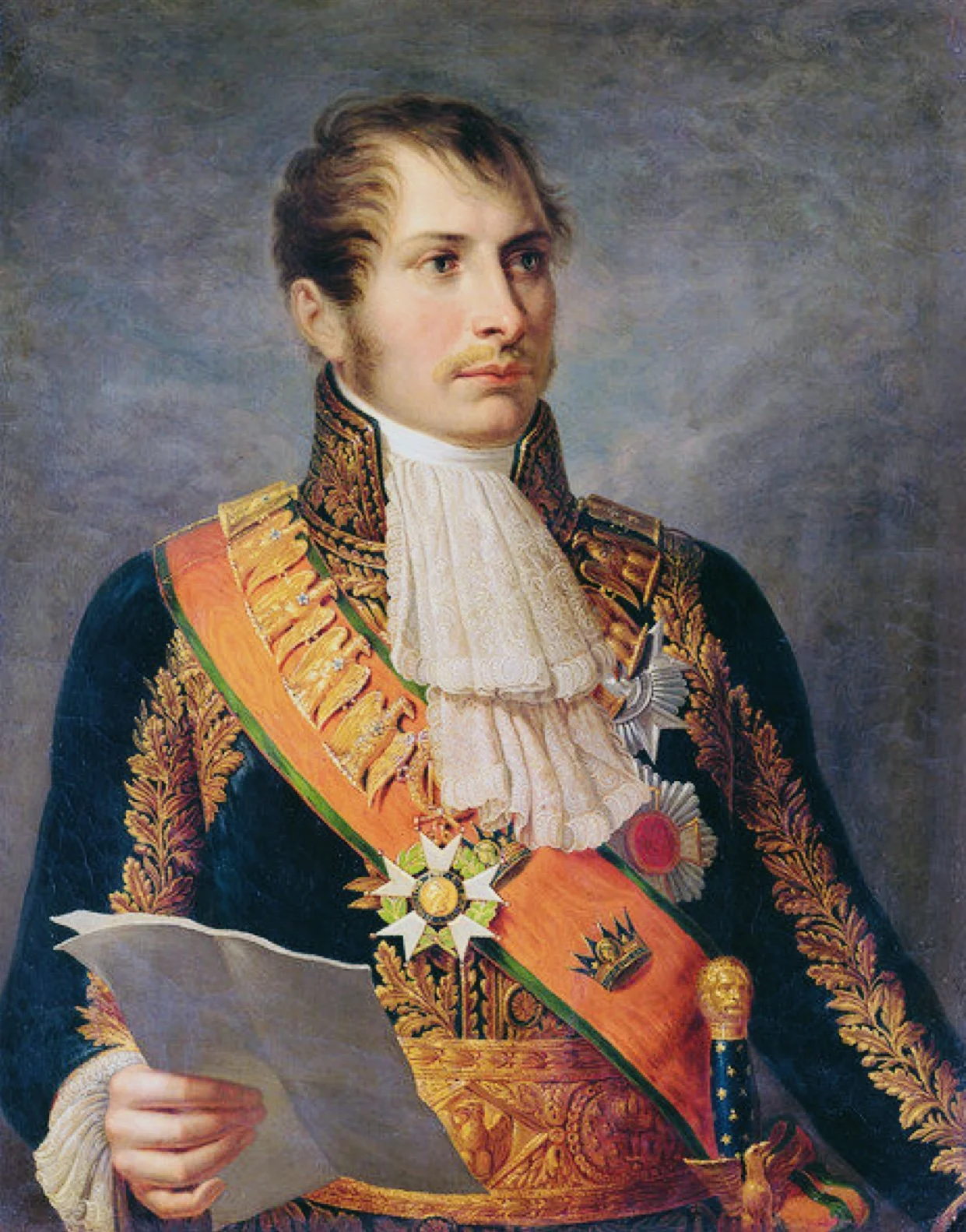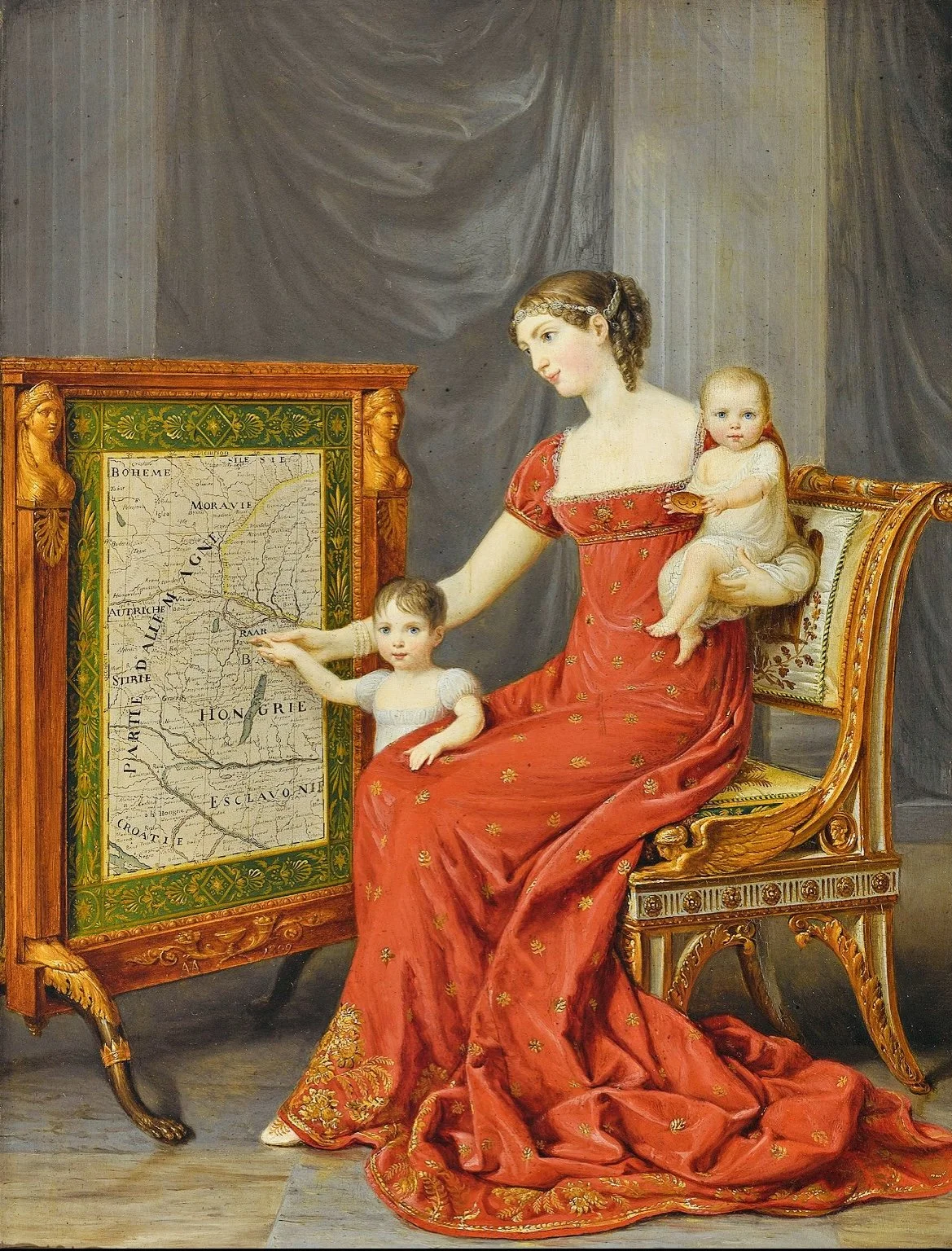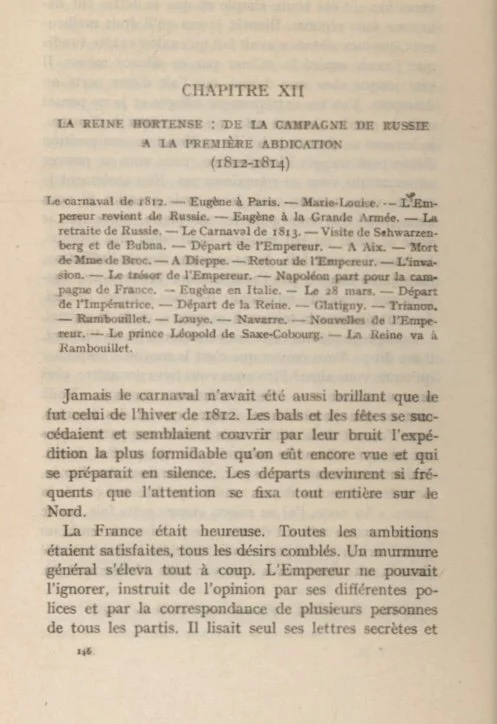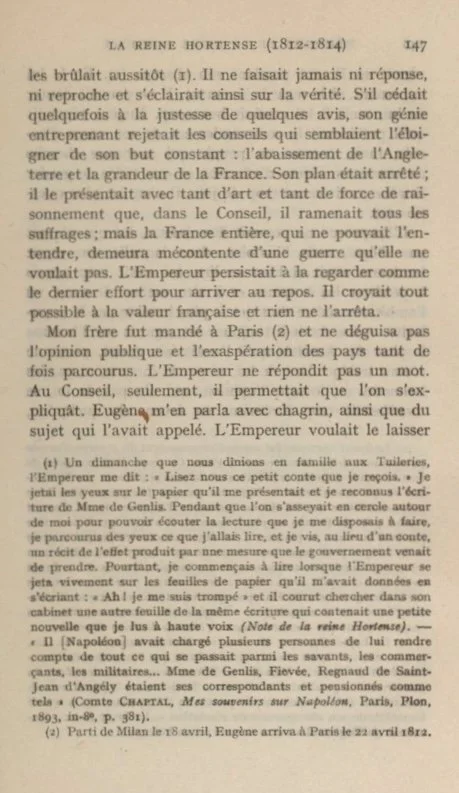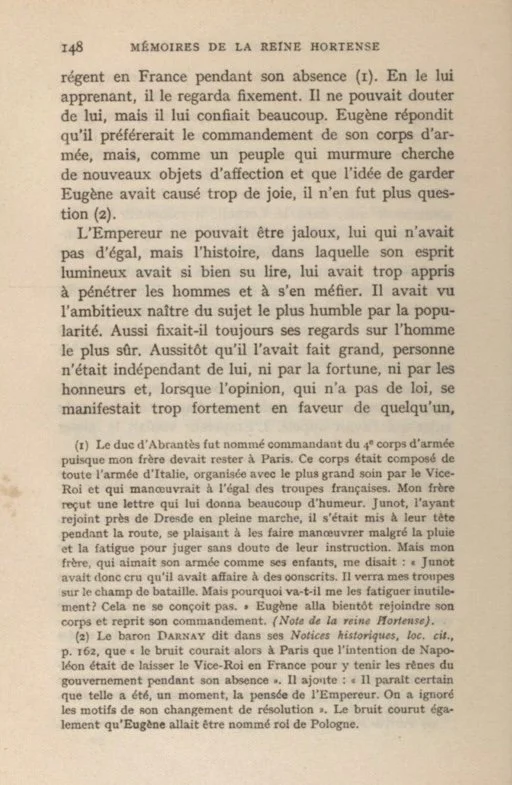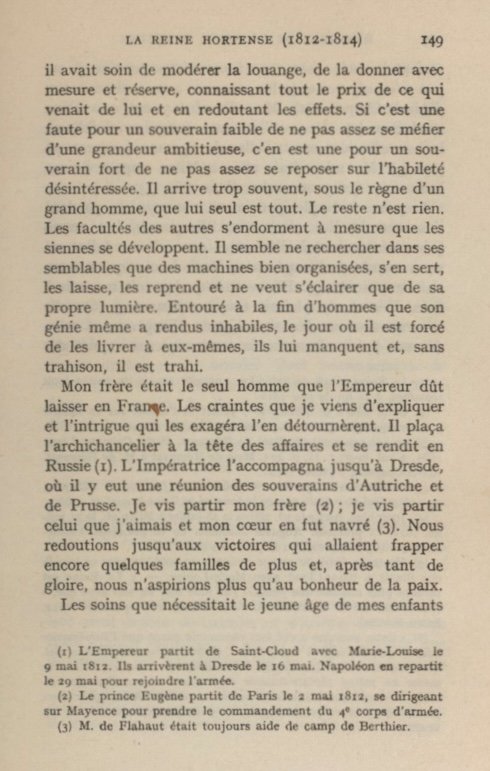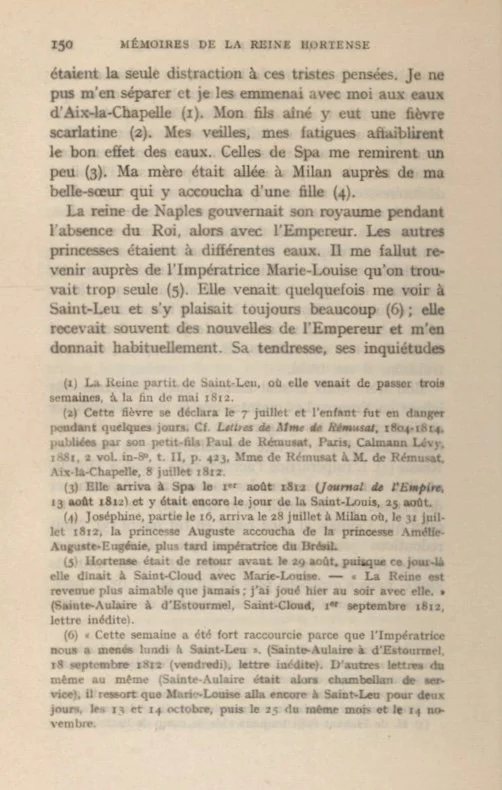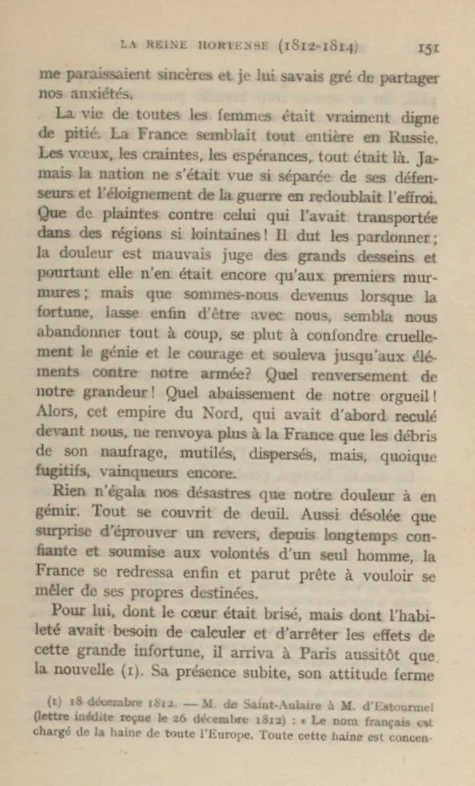Let’s have another look at Hortense’s Memoirs. If you want to read the book it is available for free at the side bar in English and French. Use the widget on the sidebar to translate the text below into pretty much any language.
Hortense describes factors that led to the fall of Napoleon. She says he should have delegated more and he couldn’t really trust anyone he believed too popular. Hortense describes Napoleon as one of the men she cared for which is an odd way to describe one’s stepfather and brother in law.
There is an old French movie about this story where the actress portraying Hortense finally confesses her love to Napoleon and Napoleon explains why the barriers between them were insurmountable. The scene can be viewed below at around 1:19:11.
Hortense’s memoirs continues:
CHAPTER XI
FROM THE CAMPAIGN IN RUSSIA TO THE FIRST ABDICATION (1812-1814)
The Carnival of 1812—Eugene in Paris—Napoleon's Return from Russia—Eugene and the Grande Armee—The Retreat from Russia—The Carnival of 1813—The Death of Madame de Broc at Aix-en-Savoie—Hopes of Peace—The Invasion—The Imperial Treasure—Napoleon Sets Out on the Campaign of France—Paris Is Threatened—March 28—The Departure of the Empress—The Departure of the Queen At Glatigny, Trianon and Rambouillet—News of the Emperor—The Queen at Rambouillet—Empress Marie Louise—The Departure for Malmaison.
NEVER has the carnival been as brilliant as that of the winter of 1812. Balls and receptions followed one another constantly and it seemed as though their clamor were intended to cover the silent preparations for the most formidable military expedition that had ever been undertaken.
People kept leaving Paris so frequently that everyone's attention turned north. France was contented. All ambitions were satisfied, all desires fulfilled. Suddenly a spirit of restlessness appeared.
The Emperor could not ignore it. His various police departments and the letters he received from members of all political parties informed him of the state of public opinion. He alone read his secret reports and burned them at once. He never either answered them or criticized them, but kept informed of exactly what was being said.
Although he sometimes admitted the wisdom of some of the advice, his farseeing mind discarded everything that might turn him from his ultimate goal, the final defeat of England and the triumph of France. His plans had been made. He presented them so skillfully and with such strong arguments that at his Cabinet council he obtained everyone's approval. But France, unable to hear his voice, distrusted the idea of a war which she did not desire.
The Emperor persisted in thinking that it was the last effort required, that it would lead to a final peace. He thought that French courage could achieve anything. And he allowed nothing to interfere with his plans. My brother was called to Paris. He frankly pointed out the state of public opinion and the general irritation of the countries through which he had so often passed.
The Emperor did not say a word in reply. It was only in the Cabinet Council that he allowed matters to be discussed. Eugene told me how much he regretted this. He was worried also about the reason for which he had been summoned to Paris.
The Emperor wished to make him Regent of France during his absence. When he informed my brother of this, he looked at him hard. He could not doubt his loyalty, but the post to which he was appointing Eugene was an all important one.
My brother replied that he would prefer to remain in command of his army corps. As the Emperor felt that a nation which is discontented needs new objects for its affections, and because rumors of Eugene's nomination had been received with too much joy, nothing more was said about it.
The Emperor could not be jealous. No one was his equal. Yet the lesson of history, with which his fine mind was so familiar, had taught him all too well to guess men's motives and to distrust them.
He had seen popularity arouse ambition even in the most humble person. Consequently, he was always looking for the man on whom he could most thoroughly rely. When he had discovered him and advanced him in rank the Emperor still took care to keep him dependent upon him both for fortune and for future advancement.
If public opinion, which knows no law, became too enthusiastic about someone, the Emperor would take care to show less favor toward him, to dole it out sparingly, for he was aware of the importance of every one of his acts and foresaw their results.
If a feeble monarch is wrong not to be more suspicious of those who are too ambitious, a ruler who is strong makes an equal mistake not to rely more completely on disinterested devotion.
Under the reign of a great man it too often happens that everything revolves around him. Others do not count. Their importance lessens as his own increases.
He comes to consider those about him as efficient machines; he uses them, lays them aside, picks them up again and will only be guided by his own intuitions. In the end he finds himself surrounded by men whose value he has destroyed by refusing them more responsibility.
The day comes when he is obliged to let them act for themselves. They fall and, although not seeking to betray him, they do so. My brother was the one man the Emperor should have left in France.
The reasons I have just outlined and the intrigues which exaggerated Eugene's popularity made him refrain from doing so.
He placed the High Chancellor at the head of affairs and left for Russia. The Empress accompanied him as far as Dresden where he met the rulers of Austria and Prussia.
I watched my brother leave, I saw the other two men I cared for depart and I felt very badly. We feared even victories since they would unavoidably bring sorrow to a few more families and we desired only that happiness which is to be found in peace.
The attention which the youth of my children forced me to bestow on them was my only refuge from these gloomy thoughts. I always had to have them with me and I took them with me to the springs at Aix-la-Chapelle.
My oldest son had scarlet fever there. Besides my other fatigues nursing him day and night prevented the waters doing me very much good. Those at Spa proved more efficacious. My mother had gone to Milan to be with my sister-in-law, who gave birth to a daughter.
The Queen of Naples ruled over her dominions in the absence of the King, who was with the Emperor. The other princesses were at different health resorts.
I was obliged to return to be with the Empress Marie Louise, who people considered was being left too much alone. She came to see me sometimes at Saint-Leu and liked it very much there. She frequently received news from the Emperor and generally passed it on to me.
Her affection and her anxiety about him seemed to me sincere, and I appreciated her sharing our uneasiness. The life of all of us women was really a pitiful one. All France seemed to be in Russia. Our desires, our fears, our prayers—all were directed there.
The original French is available below:

